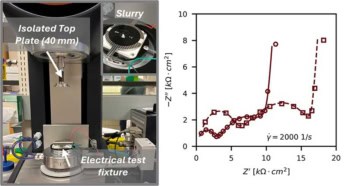James McKenzie examines the key messages of a new report on the green economy from the Institute of Physics, which puts the work of physicists front and centre

“Over the next quarter of a century the world will determine its fate more profoundly than at any time since the first industrial revolution. We are at a fork in the road.” That’s the sobering warning from the University of Birmingham nuclear physicist Martin Freer in the foreword to the recent Physics Powering the Green Economy report from the Institute of Physics (IOP), which publishes Physics World.
“One path,” Freer adds, “sees us fail to transition away from fossil fuels, with runaway climate change. The other offers a future where we limit climate change and embrace clean technologies that transform the way we live, travel and work.”
Alok Sharma, the physicist who served as president of the United Nations COP-26 conference, calls climate change “the defining issue of our age”
As the outgoing vice-president of science and innovation at the IOP, Freer is well aware that physicists are part of the solution. “Success at this juncture will be made possible by the green economy, built on sustainable, low-carbon technologies,” he says. “Many of the technologies comprising the green economy have been driven, and will continue to be driven, by physics”.
Freer’s thoughts are echoed in the report by Alok Sharma, the physicist who served as UK business and energy secretary in 2020/1 and was president of the United Nations COP-26 conference in Glasgow. Sharma calls climate change “the defining issue of our age”, but believes it is an issue we can overcome “if we treat it with the urgency it demands”. Physicists are ideally suited to the task, he thinks, but that it must be properly co-ordinated by government departments.
The power of physicists
Physics Powering the Green Economy is a timely reminder of how physicists are – and have been – responsible for many green innovations ranging from low-energy computing and solar cells to wind power and the batteries that are need to store energy drawn from new sources. If we want the green economy to develop, the report makes clear, it’s vital to have a healthy physics ecosystem supporting these developments.
At this stage, I should declare that I was one of the many people who contributed to the report. It is mainly aimed at policymakers in the hope that they will engage more closely with the IOP and the physics community on the green economy. But given that climate change is such an important issue, I hope you don’t mind me telling you about its key messages
The report has some detailed and solid analysis about changes in how we generate and use energy. It points out, for example, that energy from renewables in the UK and Ireland has grown continuously since 1996 as a proportion of the overall energy we produce. Wind, in fact, now accounts for two-fifths of all electricity generated in the UK (up from barely a few per cent back then).
Another area covered in depth is the amount of physics research and development supported by the UK government and funding agencies. UK Research and Innovation (UKRI), in particular, has spent almost £2.25bn since 2005 on nuclear power, renewable energy, energy storage, carbon capture plus hydrogen and other “alternative” fuels. Almost three-quarters (72%) of this money has gone into research classified as “core physics” and “strongly physics”.
Perhaps the biggest surprise of the report is the sheer number, breadth and diversity of physics-based businesses focused on the green economy
Businesses in the UK and Ireland are also playing a huge part in the green economy. According to the report, the UK’s “low carbon and renewable energy” firms have a current turnover of £54bn. The IOP’s analysis identifies, however, a much broader group of green-economy companies – spread geographically across the UK and Ireland – with a turnover of nearly £750bn. Given the UK’s gross domestic product was £2.27 trillion in 2020, that’s a significant percentage. Physics-powered green economy businesses are, it’s clear, vital for international competitiveness and economic growth.
Perhaps the biggest surprise of the report is the sheer number, breadth and diversity of physics-based businesses focused on the green economy. The report includes 19 case studies but for each company highlighted there are many tens of others working in the same area. Clean energy alone has more than 1600 companies in the UK and almost 120 in Ireland. The combined turnover of businesses operating in at least one of the five key technology areas identified in the report is put at £744bn.
Time for action
But will all this effort help the UK and Ireland to reach net-zero targets by 2050? Pragmatic and realistic as they are, 83% of physicists think we will miss that goal, according to a survey of IOP members that was carried out specially for this report. In fact, I can already hear some readers thinking, well, the report sounds worthy but it’s all a bit pie in the sky.
There are many deniers, but to me climate change is a modern-day version of a Pascal’s wager
However, it’s worth remembering the statement released in early 2020 by BlackRock Inc – the world’s largest investment manager – which said it would no longer invest in “thermal coal”. The company, which manages around $7 trillion of funds, also said it will “drop” any company directors who fail to act on financial risks from climate change. When a company the size of BlackRock acts this way, you know things are for real.
There are many deniers, but to me, climate change is a modern-day version of a Pascal’s wager. As the 17th-century French philosopher, mathematician and physicist Blaise Pascal argued, any rational person should live and act as though God exists. If God doesn’t, you’ll only have forfeited a few pleasures. But if God does exist, there’s everything to be gained. Similarly, dealing with climate change will have huge benefits – from avoiding famine and mass extinctions, to minimizing drought and food shortages.

‘Now is the time for action’ to reach net-zero climate targets, demands IOP report
Physicists Powering the Green Economy is therefore worth reading as it sets out the central role that physics – and innovations from physics – can play in building a sustainable, internationally competitive green economy in the UK and Ireland. Physicists are well suited to the task given that it’s a “systems challenge”, in which various elements have to advance in a co-ordinated way without anyone losing sight of how each piece fits together.
The skills physicists have and the way they think are perfect for the green economy. Even if you’re not involved in the sector yourself, you can help spread the message that physics is a great way for addressing climate change. Knowing that studying physics is key will surely inspire the next generation of young people looking to make their mark on the world.



